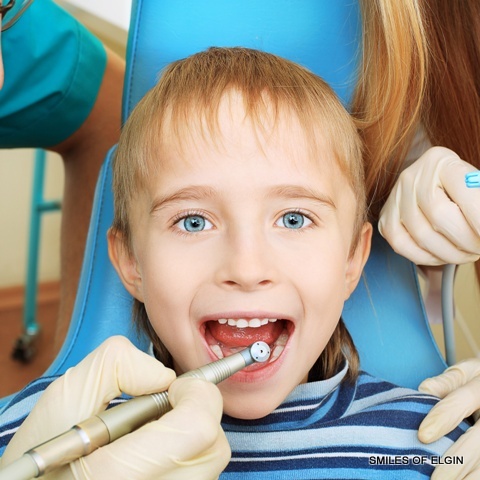1209 Dundee Avenue Elgin, IL 60120
When Should Children Have Their First Dental Visit?
The American Academy of Pediatric Dentistry (AAPD) suggests that parents should make an initial appointment with a pediatric dentist approximately six months after the emergence of the first tooth. Many times, the pediatric dentist can provide strategies for eliminating unwanted oral habits and can also help parents in establishing a daily oral routine for the child.
What potential dental problems can babies experience?
A baby is at risk for tooth decay as soon as the first tooth emerges. In particular, infants who drink breast milk, juice, baby formula, soda, or sweetened water from a baby bottle or sippy cup are at high-risk for early childhood caries. To counteract this threat, the pediatric dentist discourages parents from filling cups with sugary fluids, dipping pacifiers in honey, and transmitting oral bacteria to the child via shared spoons and/or cleaning pacifiers in their own mouths.
The pediatric dentist can also assess and balance the infant’s fluoride intake. Too much fluoride ingestion between the ages of one and four years old may lead to a condition known as fluorosis in later childhood.

What happens during the first visit?
During the initial visit, the pediatric dentist will advise parents to implement a good oral care routine, ask questions about the child’s oral habits, and examine the child’s emerging teeth. The pediatric dentist and parent sit knee-to-knee for this examination to enable the child to view the parent at all times. Usually, a topical fluoride treatment will be applied to the teeth after the cleaning.
What questions may the pediatric dentist ask during the first visit?
The pediatric dentist will ask questions about current oral care, diet, the general health of the child, the child’s oral habits, and the child’s current fluoride intake.
Once answers to these questions have been established, the pediatric dentist can advise parents on the following issues:
- Accident prevention.
- Adding xylitol and fluoride to the infant’s diet.
- Choosing an ADA approved, non-fluoridated brand of toothpaste for the infant.
- Choosing an appropriate toothbrush.
- Choosing an orthodontically correct pacifier.
- Correct positioning of the head during tooth brushing.
- Easing the transition from sippy cup to adult-sized drinking glasses
- Eliminating fussing during the oral care routine.
- Establishing a drink-free bedtime routine.
- Maintaining good dietary habits.
- Minimizing the risk of tooth decay.
- Reducing sugar and carbohydrate intake.
- Teething and developmental milestones.
Office Hours
| Monday | 10:00 to 6:00 |
| Tuesday | 10:00 to 6:00 |
| Wednesday | 11:00 to 8:00 |
| Thursday | 10:00 to 6:00 |
| Friday | 10:00 to 6:00 |
| Saturday | 8:00 to 3:00 |
| Sunday | Appointment only |



Recent Comments